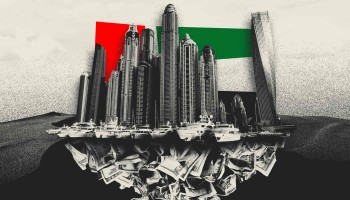Last week, OCCRP and investigative journalists from 20 other outlets uncovered how Russian politicians, sanctioned oligarchs, and criminals have poured their ill-gotten gains into luxury properties in Dubai.
The ‘Dubai Uncovered’ investigation, based on a 2020 leak by the Center For Advanced Defense Studies (C4ADS) into the emirate’s housing market, has drawn calls from EU politicians for tougher anti-money laundering measures to be taken by the UAE, lest the elective monarchy face sanctions on par with countries like North Korea.
Amongst the Dubai Uncovered revelations were luxury villas and apartments in Dubai owned by suspected drug smugglers and corrupt officials.
Multiple sanctioned Russian oligarchs were also found to have invested their fortunes through Dubai’s real estate market.
When reached for comment, the UAE Embassy in Oslo stated to the Norwegian outlet E24 that “the allegations made with regard to Dubai property ownership records are factually inaccurate. The UAE operates clear regulatory frameworks that comply with international laws and standards designed to combat financial crime.”
EU lawmakers, however, were less than inclined to believe that particular side of the story.
“Dubai Uncovered confirms once again that the United Arab Emirates have very loose anti-money laundering provisions in place,” said EU parliamentarian Markus Ferber from the European People’s Party (EPP). “Given that Dubai is a significant financial hub, such deficiencies might also have implications for other jurisdictions such as the European Union.”
The EPP is composed of center-right parties in the European Parliament and is its largest group. Ferber, a financial policy spokesperson, sits as deputy chair of the parliamentary subcommittee on tax affairs and has led a long career in Germany’s Christian Democratic Union party.
Reviewed and revised at regular intervals, the Union maintains a list of sanctioned countries that must contend with additional banking control measures as well as restricted access to Europe’s financial systems.
“I do think that the European Commission should have a very close look at the UAE the next time it revises the list. There is definitely a strong case for putting the UAE on the list”, said Ferber.
Left unchecked, politicians fear that the scale of money laundering seen in the UAE, in conjunction with the country’s lax anti-money laundering regulations, could compromise Europe’s ability to counteract organized crime and corruption.
“Ultimately, our own defense against money laundering is only as strong as the weakest link in the chain, and that is why we need to sharpen our tools for defense against money laundering,” said Ferber.
The Dubai Uncovered revelations also managed to draw support from the other side of the aisle in blacklisting the UAE.
Liberal MPs, as well as lawmakers from the Green and the Social Democrat parties, submitted a letter last Wednesday to EU Commissioner for Financial Stability Mairead McGuinness calling for immediate action.
“One week ago, The Dubai Uncovered revealed yet another example of how the United Arab Emirates is a notorious safe haven for criminal proceeds, corrupt officials, Russian oligarchs and ultra-high net worth individuals,” said Green Party member Kira M. Petter-Hansen from Denmark. “It is clear that the United Arab Emirates facilitates money laundering at a grand scale. This is highly damaging to the EU and cannot be tolerated.”
Though the final figure remains unknown, the leaks have so far uncovered more than US$30.6 billion funneled through the emirate's real estate market by European citizens and companies.




